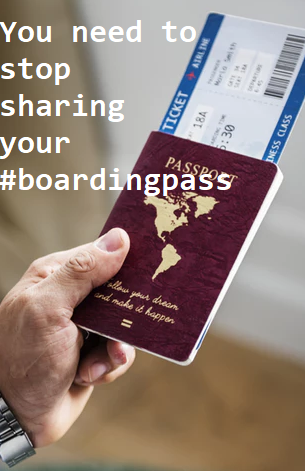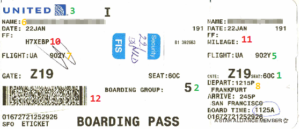
You should never post your boarding pass on social media, no matter how badly you want to brag about #firstclass.
Let’s start with the obvious: your boarding pass tells people you’re going on vacation, and when. Someone could see this and decide your house is prime for robbing. If you’re lucky like Drake, they’ll only take a $10 bottle of water. But it’s more likely to go down how it did for Nicki Minaj—someone stole all of her jewelry when she was on vacation. For Simon Cowell, a thief even took his passport. Good luck taking your next international trip without that!
What else does your boarding pass include? Well, if you have the code SSSS on your boarding pass, bad news. This code singles you out for extra security screening. Check for this code ASAP when you first get your boarding pass—if you have it, you know to allow yourself extra time to go through security.
Most importantly, your boarding pass contains the barcode that gets you on your flight. If you’ve ever flown before, you already know this, but what you may not know is how easy it is to steal a barcode. Someone can screenshot the barcode from your post on social media and make a fake pass in less than a minute. They can then use it at the airport in your place.
There’s more you need to know about your boarding pass. We’ve gone ahead and decoded it for you.

Green – less sensitive.
- Seat Number: You’re probably safe sharing your seat number online, unless there’s someone on your plane you want to avoid talking to!
- Group: Your group determines when you board the plane. This isn’t sensitive information for most.
- Airline Company: Your boarding pass includes what airline you’re flying with. This is not particularly sensitive information.
- SEQ: Your SEQ tells you what number ticket you have—if your SEQ is 1 you were the first person to book a ticket for the flight, if it is 100 you were the 100th, and so on. Interesting to know, but not sensitive. SEQ is not pictured on this ticket.
- Class: Business class is “J”, Economy “Y”, First “F” and Premium “P”. This is pretty safe to share online—unless you are telling people you are flying first class when your boarding pass says coach!
Yellow – moderately sensitive.
- Full name: While you may already have your full name online, this can be sensitive information to some.
- Flight number: The flight number on your boarding pass tells people exactly which flight your on. This may be more information than you want people to know about you.
- Where you are going, when: Maybe you’ve already told everyone where you are going and when, but you may not want to post this information online—someone could decide to pay a visit to your house because they know when you will be away.
- SSSS: If you have SSSS on your boarding pass, bad news. This code means you have been selected for additional security screening. While this code can be placed on your boarding pass randomly, some people always have SSSS on their boarding pass. If you’re one of those people, you might not want others to know this.
Red – very sensitive.
- Booking Reference: Now we’re getting into the serious stuff. Your booking reference is clearly visible on your boarding pass. This is the number you use to check in, select your seats or upgrade your flight. You really don’t want this in anyone’s hands but your own!
- Frequent Flyer Number: Your frequent flyer number is included on your ticket. Someone with your frequent flier number could potentially get into your account and treat themselves to your miles!
- Bar Code: Your bar code is the most important (and most sensitive) piece of information on your boarding pass. Your barcode is what gets you on the flight, and—unfortunately—is very easy to steal. If you share a picture of your boarding pass with the barcode, one only needs to take a screenshot to use it. If you take anything away from this article, it should be not to post the bar code online. You don’t want anyone to hijack your first class ticket to Paris!
One last tip
- And don’t even think about throwing your boarding pass away at the airport or hotel. Someone could still take and use much of the information on your pass. Instead, shred or cut up your boarding pass and dispose of it at home.

 Save up to 60% on Business Class. Call 1-800-435-8776
Save up to 60% on Business Class. Call 1-800-435-8776
Leave A Comment